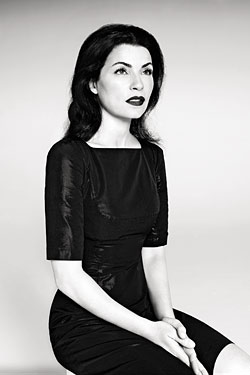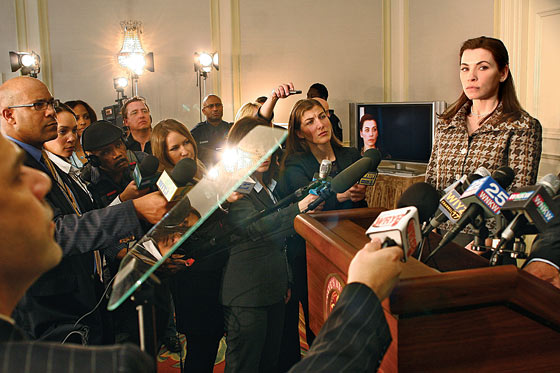
It’s the now all-too-familiar scenario. Cameras zoom in on a humbled politician reading a prepared statement about his failures as a public servant and husband. He’s resigning, he says, because he was caught paying money for sex. At this point, after so many of these confessions, your eyes roll with practiced cynicism; you stifle a yawn. Middle-aged big shot felled by adolescent libido. Tell us something we don’t know. The real question mark is standing beside him: the inscrutably steadfast wife. Why is she up there, supporting someone who betrayed her so publicly? How humiliating, and how fascinating.
Robert and Michelle King watched that melodrama play out with Eliot and Silda Wall Spitzer. During the weeks that followed, as New York obsessed and buzzed over the scandal, the two came up with the idea for the new CBS drama, The Good Wife (September 22 at 10 p.m.). “We wanted to explore how one would move on from this kind of betrayal,” says Michelle. “To us, that’s where the drama comes in.”
The Good Wife begins with shamed Illinois state attorney Peter Florrick (played by Chris Noth, Sex and the City’s Mr. Big, so he knows from womanizing) performing his mea culpa. At his side, wife Alicia looks on—a ghostly sphinx in the form of Julianna Margulies, who, like the Kings, followed the Spitzers with morbid curiosity. “I wondered, what happens in that greenroom? You see this woman standing behind her husband, looking ten years older than she did six months ago, and I was so taken by it,” she says. “I always thought, How can she stay? I would leave.”
As the titular wife, Margulies, 43, has the opportunity to explore one possible alternative. It won’t give much away to say that her husband is convicted of using government money for prostitutes and goes to jail, that the couple remain married, and that the 40-year-old mother of two returns to her law career to support her family, starting as an entry-level associate after thirteen years at home. Or to add that she is, at least in the early episodes, too angry to forgive her husband yet too entrenched to leave. “I have a close friend who had a tough time in her marriage,” says Margulies. “She was on my couch crying about her husband’s midlife crisis. But there are always two sides—she said she was mad at him all the time, that she never wanted to have sex. She forgave him, and now they have the best sex life they’ve ever had. Alicia, she loves her husband,” adds Margulies. “He’s her rock. No situation is black and white.”
Indeed. Spitzer, who easily avoided jail time, is rumored to be interested in running for public office again. Silda, who stayed loyal, threw him a 50th-birthday party in June. Where’s the justice in that outcome?
Though The Good Wife isn’t a revenge fantasy—Margulies’s character is too hard up to justify any “You go, girl!” sentiments—viewers are treated to the sort of vicarious retribution they don’t get in real life. Right after the opening scene, the show cuts to a hallway outside the press conference, where the stunned Alicia stops dead in her tracks. When Peter turns to console her, she slaps him across the face.
“That’s the first time you see them alone, and she’s not only slapping him, she’s slapping herself awake,” says Robert, who co-wrote the first episode with Michelle. “We really wanted for this character not to be one of those earnest-women roles. It feels like TV depicts women as very dedicated, out to fight the ills of the world, as the long-sufferer at home. We didn’t want Alicia to be one of those women.” And as played by Margulies, she is, more critically, instantly winning and believable. “Julianna can go from gravitas to comedy in a heartbeat,” says Robert. “We love the lightness she brings to the role, in addition to the vulnerability. You’ll see more of her comedy chops in future episodes.”
If hilarity isn’t the first adjective you associate with Margulies, you’re forgiven. The actress made her name playing ER’s Nurse Hathaway, the very definition of long-suffering stoicism, for six years. In fact, the series opened with her lovesick suicide attempt over Dr. Doug Ross, played by then-little-known George Clooney. Since turning down a reported $27 million renewal contract for ER in 2000, Margulies’s career has been, shall we say, low profile. Yet hidden among the failed series (Fox’s Canterbury’s Law) and mediocre films (not counting the stupendously cheesy Snakes on a Plane, of course) were some genuinely amusing moments on Scrubs (“One of the funniest things I’ve seen,” says Robert) and a rivetingly sordid arc on the final season of The Sopranos.

For Margulies, The Good Wife came at exactly the right moment. The smart script renews her faith in television, especially after her “bad experience with Fox.” And it allows her to work in New York, where she has resettled with lawyer-husband Keith Lieberthal and their 19-month-old son, Kieran. “I don’t want to schlep all over the world,” she says.
The show, aided and abetted by co-stars Christine Baranski and Sports Night vet Josh Charles, is ultimately a standard, if well-written, legal procedural with some predictable twists. (Alicia, because of her own experience, overidentifies with her clients.) But Margulies is keenly aware that any attention, at least initially, will focus on the scandal and its aftermath. “My only worry about this show, honestly, is that any women who this has happened to will have to relive it,” she says. “I would hate for them to think, ‘Oh, there’s that bitch Julianna; I just finally got past it, and now it’s up in my face again.’ ”